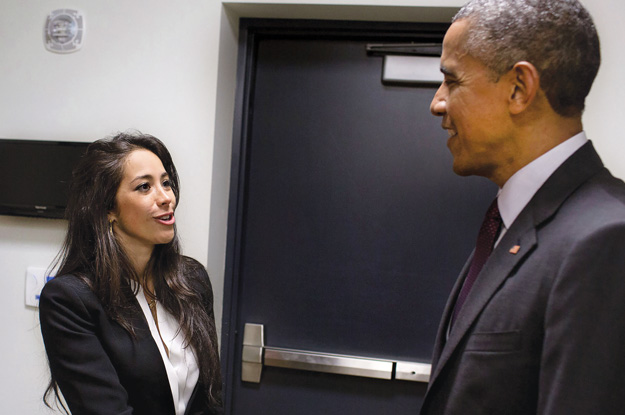This article has been updated
This article is adapted from our AQ Top 5 feature on young Latin American entrepreneurs. To see the rest of our list, click here.
Jimena Flórez’s story of entrepreneurial success starts, improbably, with a cold beer in Germany.
After graduating high school in her native Colombia, Flórez spent a gap year living with a family in southern Germany who produced their own organic hops. In addition to teaching her the difference between a lager and a pilsner, her host family taught Flórez the essentials of sustainable agriculture: how organic techniques can protect against crop failure, boost yield and add value.
That experience set Flórez on a life-changing career path. Over the next five years, while studying finance and international relations — first at a university in Colombia and later at a business school in Australia — she learned how to apply the grassroots knowledge she gained in Germany to the complexities of global supply chains, finance, trade and consumer behavior. But she also learned how economic growth can displace rural communities. She soon realized that the case studies she had explored as a student held important lessons for Colombian agriculture — and she was eager to return.
“I wanted to go back to Colombia … with my new knowledge of organic agriculture to help farmers, so that they could stay in the fields and wouldn’t have to risk moving to cities to look for jobs,” Flórez told AQ.
When she returned home in 2011, Flórez started talking with state institutions, schools, businesses — anyone who would listen — about her desire to start agricultural sustainability programs for rural farmers. Eventually, a university in Bogotá took her up on the idea and hired her to develop a curriculum program to educate young farmers on sustainable techniques. The Ministry of Education financed the project, which is still used to provide training to communities in the department of Santander in northeast Colombia.
But Flórez wanted to do more than teach smart farming techniques; she wanted to demonstrate their potential. With a childhood friend, Flórez founded a social enterprise that would become a model for how to take organic crops from the farm to the table. “We buy sustainable produce, we transform it, and we use it to market products thinking about the final consumer. That’s how Crispy Fruits was born,” she said. The company bought dried fruits from farmers in the suburbs of Bogotá, and in 2012 started selling nationally.
As the company grew, Flórez started began for ways to introduce the snacks to the U.S. When her ventures didn’t produce the returns she had hoped for, “I had no option but to innovate,” she recalled. She identified the market created by growing concern in the U.S. among civil society groups, parents and educators over childhood obesity. Crispy Fruits became Chaak Healthy Snacks, a brand of gluten-free, low-sugar cakes and brownies made for children with obesity-related problems, partially sourced from the same farmers who participated in the program Flórez designed in Colombia. Thanks in part to a partnership with the Rutgers Food Innovation Center in New Jersey, Chaak is now working toward a goal of providing snacks to around 90,000 children per month by July.
Chaak is pivately held and does not disclose financial information, but just three years after its founding, and still with only 13 employees, the company has developed partnerships with public health agencies, schools and retailers in the U.S. and Colombia. In 2015, Flórez was one of just six young entrepreneurs invited to attend a Global Entrepreneurship Event hosted by U.S. President Barack Obama. In his remarks, Obama thanked Flórez for “helping to lift up her community.”
“It was humbling,” said Flórez, who now shuttles between Bogotá and New York, where she spends half her time. Flórez told AQ she had dreamed of running a business since she was a nine-year-old selling homemade candies to her classmates — but to do it in a way that met social needs was especially rewarding.
Still, Flórez believes more government support for social entrepreneurship is needed. Especially in the context of an internal conflict that has sharply divided public opinion in Colombia, initiatives like hers offer a nonpolitical form of reconciliation. “It’s changing the mentality from ‘I don’t care if you were a guerrilla’ to ‘Here’s an opportunity for you to progress.’” Cheers to that.
This piece has been updated after Flórez told AQ that Chaak’s project with Rutgers will provide snacks to around 90,000 children a month by July, but has not reached that goal yet.
—
Krygier is an editorial intern for AQ.





